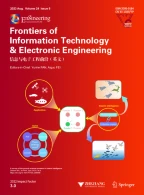Abstract
Mathematical models are disappointing due to uneven distribution of the air gap magnetic field and significant unmodeled dynamics in magnetic bearing systems. The effectiveness of control deteriorates based on an inaccurate mathematical model, creating slow response speed and high jitter. To solve these problems, a model-free adaptive control (MFAC) scheme is proposed for a three-degree-of-freedom hybrid magnetic bearing (3-DoF HMB) control system. The scheme for 3-DoF HMB depends only on the control current and the objective balanced position, and it does not involve any model information. The design process of a parameter estimation algorithm is model-free, based directly on pseudo-partial-derivative (PPD) derived online from the input and output data information. The rotor start-of-suspension position of the HMB is regulated by auxiliary bearings with different inner diameters, and two kinds of operation situations (linear and nonlinear areas) are present to analyze the validity of MFAC in detail. Both simulations and experiments demonstrate that the proposed MFAC scheme handles the 3-DoF HMB control system with start-of-suspension response speed, smaller steady state error, and higher stability.
Similar content being viewed by others
References
Cao, X., Deng, Z.Q., 2010. A full-period generating mode for bearingless switched reluctance generators. IEEE Trans. Appl. Supercond., 20(3):1072–1076. https://doi.org/10.1109/TASC.2010.2041206
Casella, F., 2004. Modeling, simulation, control, and optimization of a geothermal power plant. IEEE Trans. Energy Conv., 19(1):170–178. https://doi.org/10.1109/TEC.2003.821823
Chen, L., Hofmann, W., 2012. Speed regulation technique of one bearingless 8/6 switched reluctance motor with simpler single winding structure. IEEE Trans. Ind. Electron., 59(6):2592–2600. https://doi.org/10.1109/TIE.2011.2163289
Chen, S.L., Weng, C.C., 2010. Robust control of a voltagecontrolled three-pole active magnetic bearing system. IEEE/ASME Trans. Mechatron., 15(3):381–388. https://doi.org/10.1109/TMECH.2009.2027015
Cimuca, G., Breban, S., Radulescu, M.M., et al., 2010. Design and control strategies of an induction-machine-based flywheel energy storage system associated to a variablespeed wind generator. IEEE Trans. Energy Conv., 25(2):526–534. https://doi.org/10.1109/TEC.2010.2045925
Fang, J.C., Sun, J.J., Liu, H., et al., 2010. A novel 3-DoF axial hybrid magnetic bearing. IEEE Trans. Magn., 46(12):4034–4045. https://doi.org/10.1109/TMAG.2010.2074206
Formentin, S., Savaresi, S.M., Del Re, L., 2012. Non-iterative direct data-driven controller tuning for multivariable systems: theory and application. IET Contr. Theory Appl., 6(9):1250–1257. https://doi.org/10.1049/iet-cta.2011.0204
Han, B.C., Zheng, S.Q., Le, Y., et al., 2013. Modeling and analysis of coupling performance between passive magnetic bearing and hybrid magnetic radial bearing for magnetically suspended flywheel. IEEE Trans. Magn., 49(10):5356–5370. https://doi.org/10.1109/TMAG.2013.2263284
Hildebrand, R., Lecchini, A., Solari, G., et al., 2005. Asymptotic accuracy of iterative feedback tuning. IEEE Trans. Autom. Contr., 50(8):1182–1185. https://doi.org/10.1109/TAC.2005.852551
Kang, M.S., Lyou, J., Lee, J.K., 2010. Sliding mode control for an active magnetic bearing system subject to base motion. Mechatronics, 20(1):171–178. https://doi.org/10.1016/j.mechatronics.2009.09.010
Lee, J., Jeong, S., Han, Y.H., et al., 2011. Concept of cold energy storage for superconducting flywheel energy storage system. IEEE Trans. Appl. Supercond., 21(3):2221–2224. https://doi.org/10.1109/TASC.2010.2094177
Mišković, L., Karimi, A., Bonvin, D., et al., 2007. Correlationbased tuning of decoupling multivariable controllers. Automatica, 43(9):1481–1494. https://doi.org/10.1016/j.automatica.2007.02.006
Morrison, C.R., Siebert, M.W., Ho, E.J., 2008. Electromagnetic forces in a hybrid magnetic-bearing switchedreluctance motor. IEEE Trans. Magn., 44(12):4626–4638. https://doi.org/10.1109/TMAG.2008.2002891
O’Sullivan, D.L., Lewis, A.W., 2011. Generator selection and comparative performance in offshore oscillating water column ocean wave energy converters. IEEE Trans. Energy Conv., 26(2):603–614. https://doi.org/10.1109/TEC.2010.2093527
Sala, A., Esparza, A., 2005. Extensions to “virtual reference feedback tuning: a direct method for the design of feedback controllers”. Automatica, 41(8):1473–1476. https://doi.org/10.1016/j.automatica.2005.02.008
Sarkar, S., Ajjarapu, V., 2011. MW resource assessment model for a hybrid energy conversion system with wind and solar resources. IEEE Trans. Sustain. Energy, 2(4):383–391. https://doi.org/10.1109/TSTE.2011.2148182
Subkhan, M., Komori, M., 2011. New concept for flywheel energy storage system using SMB and PMB. IEEE Trans. Appl. Supercond., 21(3):1485–1488. https://doi.org/10.1109/TASC.2010.2098470
Wakitani, S., Yamamoto, T., 2014. Design and application of a data-driven PID controller. Proc. IEEE Conf. on Control Applications, p.1443–1448. https://doi.org/10.1109/CCA.2014.6981527
Wang, K., Wang, D., Lin, H.Y., et al., 2014. Analytical modeling of permanent magnet biased axial magnetic bearing with multiple air gaps. IEEE Trans. Magn., 50(11):1–4. https://doi.org/10.1109/TMAG.2014.2330843
Wei, K.Y., Liu, D.Z., Meng, J., et al., 2010. Design and simulation of a 12-phase flywheel energy storage generator system with linearly dynamic load. IEEE Trans. Appl. Supercond., 20(3):1050–1054. https://doi.org/10.1109/TASC.2010.2040599
Xu, J.X., Hou, Z.S., 2009. Notes on data-driven system approaches. Acta Autom. Sin., 35(6):668–675. https://doi.org/10.1016/S1874-1029(08)60090-7
Yang, G., Deng, Z.Q., Cao, X., et al., 2008. Optimal winding arrangements of a bearingless switched reluctance motor. IEEE Trans. Power Electron., 23(6):3056–3066. https://doi.org/10.1109/TPEL.2008.2002070
Yang, Y., Deng, Z.Q., Yang, G., et al., 2010. A control strategy for bearingless switched-reluctance motors. IEEE Trans. Power Electron., 25(11):2807–2819. https://doi.org/10.1109/TPEL.2010.2051684
Yuan, Y., Sun, Y.K., Huang, Y.H., et al., 2015. Harmony chaotic search optimal design of single winding bearingless switched reluctance flywheel motors. Tran. China Electrotechn. Soc., 30(2):180–188 (in Chinese). https://doi.org/10.3969/j.issn.1000-6753.2015.02.024
Zhang, C., Tseng, K.J., 2007. A novel flywheel energy storage system with partially-self-bearing flywheel-rotor. IEEE Trans. Energy Conv., 22(2):477–487. https://doi.org/10.1109/TEC.2005.858088
Zhu, Y.M., Hou, Z.S., 2015. Controller dynamic linearisationbased model-free adaptive control framework for a class of non-linear system. IET Contr. Theory Appl., 9(7):1162–1172. https://doi.org/10.1049/iet-cta.2014.0743
Author information
Authors and Affiliations
Corresponding author
Additional information
Project supported by the National Natural Science Foundation of China (Nos. 51707082 and 51607080), the Natural Science Foundation of Jiangsu Province, China (Nos. BK20170546 and BK20150510), the China Postdoctoral Science Foundation (No. 2017M620192), and the Priority Academic Program Development of Jiangsu Higher Education Institutions
Rights and permissions
About this article
Cite this article
Yuan, Y., Sun, Yk., Xiang, Qw. et al. Model-free adaptive control for three-degree-of-freedom hybrid magnetic bearings. Frontiers Inf Technol Electronic Eng 18, 2035–2045 (2017). https://doi.org/10.1631/FITEE.1700324
Received:
Accepted:
Published:
Issue Date:
DOI: https://doi.org/10.1631/FITEE.1700324
